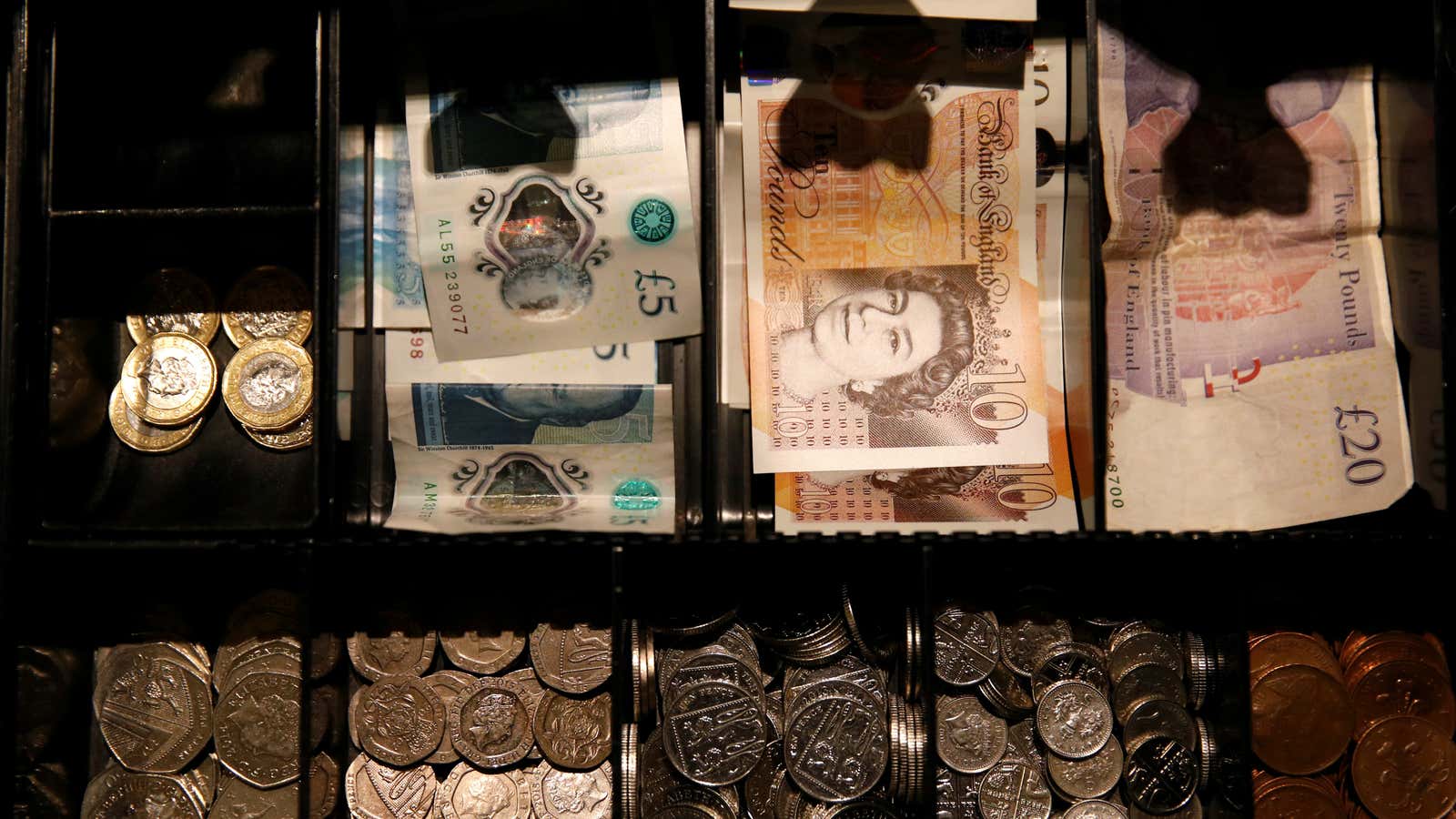Cash usage in Britain is on the wane, and the infrastructure to support it is becoming unsustainable. To avoid leaving behind millions of people who depend on physical notes and coins, the country’s cash systems require a radical overhaul, according to the latest findings of the UK’s Access to Cash Review.
Changing tastes are only part of the reason for the cash crunch. Many Brits, especially younger people, increasingly prefer to pay by tapping a contactless card or to swap money with friends using an app. Only about 30% of transactions in the UK use cash, and that figure is expected to fall to as low as 10% in the next 15 years.
The greatest pressure on cash use is coming from declining profits on cash handling, which includes everything from ATMs to money sorting and armored cars. In Sweden and China, the most cashless of societies, it was declining acceptance by merchants that really drove out cash, and the review expects a similar development in the UK, where running the cash infrastructure costs about £5 billion ($6.6 billion) a year.
The British system was designed for an age of “high cash,” which has resulted in expensive duplicative infrastructure, according to Natalie Ceeney, chair of the Access to Cash Review. (The Access to Cash Review was funded by the Link ATM network but says it is independent from the cash-handling service.) While operating costs are fixed, profits are evaporating.
The elderly, poor, and people with handicaps can be especially unprepared when cash isn’t accepted. And there’s still not a satisfactory answer for dealing with the loss of privacy when every transaction leaves digital fingerprints. For now, cash is “an economic necessity” for around 25 million people in the UK, according to a December report, also by the Access to Cash Review. Nearly half of people surveyed said a cashless society would be problematic for them, and 14% of that subset said they had serious concerns about coping. Rural areas are among the most at risk, as broadband internet is less reliable or unavailable.
To make sure people aren’t left behind, today’s report published a series of recommendations:
1️⃣ Guarantee access to cash: Britain could look to develop cash innovations and consider widening cash access from convenience stores and post offices. Some cash systems might have to be maintained at a loss for the good of society.
2️⃣ Ensure cash is widely accepted: Keeping the cost of cash handling as low as possible means merchants will be more likely to use it. For now, avoid a “draconian” legal requirement for merchants to accept cash (which would be hard to enforce), make sure utilities and government services accept cash, and remind organizations of the downside implications of changing payment options.
3️⃣ Create a more resilient, efficient cash system: The Bank of England should bring together the major UK banks to design a new cash infrastructure that meets Britain’s needs for the next 10-15 years. A utility-like system to help cash providers collaborate could keep costs down, and keep cash systems financially viable for longer.
4️⃣ Ensure that digital payments are an option for everyone: Make this a priority for the government and for financial regulators.
5️⃣ Ensure joined-up oversight and regulation of cash: Develop a government policy for cash in Britain, and make sure it doesn’t fall between the regulatory cracks.
Cash is still widely available and used in the UK. But Sweden, which will become effectively cashless in a few years, has demonstrated that it’s difficult to revive cash handling systems once they’re gone. In Britain, cash machines are vanishing at a rate of about 300 per month. A change in the amount banks pay to support the UK’s free ATM network—which would have wiped out even more cash options in rural areas—was reversed last year after a public outcry.
There are a number of reasons why switching to digital payments can be a good thing. When merchants stop holding large amounts of cash, their workers are less likely to be targeted by violent robbery. It can also be faster and cheaper than processing notes and coins. For governments, cash is problematic because it helps enable the underground economy through tax evasion as well as illicit finance. And keeping cash around doesn’t encourage the more than 1 million people who don’t have bank accounts for formal financial services.
Many countries don’t have a plan when it comes to cash. If the UK’s Access to Cash Review has one lesson for the rest of the world when it comes to declining cash usage, it’s that “sleepwalking” into it is the riskiest approach.
